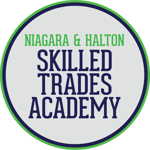
When you are deciding the best course of action to pursue an education in the skilled trades in Ontario, there are a few options available. Ultimately, you need to attend some version of post-secondary schooling to qualify for a jobs in the skilled trades, but which is more appropriate: traditional college courses or a private career college?
If you attend a traditional Ontario college program for a skilled trade, you will be working toward a diploma and take a minimum of 2 years of study. Alternatively, a private career college awards a certificate and/or license upon completion, with programs that tend to be shorter and more intensive, with smaller class sizes and hands-on learning experience.
College diploma vs. Private Career College certificate
So, what's the difference between a college diploma and a skilled trades certificate from a private career college? Both are achievements that you receive when you successfully complete the program or courses you have enrolled in.
Some schools may use these terms interchangably, however diploma programs are typically more comprehensive (and longer) programs. These programs also may not give you a skilled trades license, which you receive upon successfully completing an exam from the Ontario College of Trades. Private career colleges, however, tend to be shorter courses, focused exclusively on the skills needed to pass your final Ontario College of Trades exam.
Deciding on your skilled trades education
When deciding on your post-secondary education path to a skilled trades career, there are many factors to think consider. Think about the following questions when making your decision:
- What interests you? What skills do you have now that you can expand on to build a successful career?
- What is the type of training or level of education required by the industry to work in your field of interest? Will you need a diploma to get hired? Or a specialized training program that will provide you with a certificate and/or license? Talk to schools, employers and trades people to find out what is required.
- Are there employment opportunities in your chosen field?
- What type of learner are you? Do you prefer hands-on learning?
- What type of environment do you learn best in? A large group environment or in a smaller move individualized setting?
- How much time are you willing to commit to your education? Can you attend classes full-time or do you need a part-time program?
- How much money can you invest in your education? Are there financial aid options for the program you are interested in?
Think a private career college is the right choice? Find out more about how you can fund your skilled trades education with our FREE ebook:

